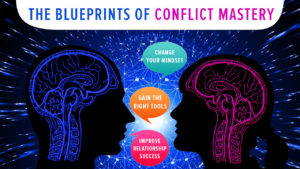If you are a company CEO, employee, a parent or partner, I am sure you know firsthand, how fast conflicts can happen without much effort. Topics like politics or religion promote it much faster than some others. If an employee receives an unfavorable work review, it can fuel battles and possible revenge — at least within the mind of the worker. Going forward, the employee may not demonstrate the same level of commitment.
Whether married or single, issues of parenting, expectations, or how someone engages or disengages during a conversation can also lead to conflicts. After all, who does not want their words, opinions, or dedication to their work respected?
When it comes to reasons clashes occur between people, there are endless triggers. The limited or lasting affects can divide and even destroy everyday connections.
Unresolved disagreements can intensify within a person’s mind or actions. This, in turn, can have adverse affects within other interactions, on a person’s job performance, or on an individual’s health.
These scenarios help prove reasons conflict mastery is an essential key to success in all kinds of relationships.
Why We Avoid Conflict
Whether I have dealt with conflict as a manger between employees, with students in academia, in mediation or therapy with difficult clients or even within my own family, resolving differences between people with challenging personalities or opposite viewpoints often proves difficult.
Some adults never learned the right ways to manage personality differences with others as children. This often leads to wrong attitudes, approaches, and avoidances of proper solutions between otherwise mature people.
Most of us can recall times we tried to confront conflict head-on, with unfavorable results like losing our tempers, or sadly, separation from a valued friend or relationship. We might have also watched small clashes between others from afar as they started and then, worsened.
Experiences like these can affect the mind and emotions in undesirable ways. Since most people perceive conflicts as harmful and emotionally unhealthy, many avoid them at all cost — even to their own detriment. It is vital to deal with conflict within wise timeframes; ignoring them does not make them go away. They might instead intensify.
How Unresolved Conflict Affects Your Health
If you think about past conflict or conflicts most of the time, and it causes you to lose sleep, it affects your attitude and relationships, and even causes stress and anxiety – deal with it – fast. It fuels un-forgiveness, chronic tension, and often leads to physical and emotional issues with health. It is important to develop the right skills to address conflict in a healthy way. Learn to let it go and forgive others in order to prevent internal physical issues that often lead to various illnesses.
According to the American Institute of Stress, over 60% of chronic illnesses related to stress can increase odds of heart disease, heart attacks, and strokes. Toussaint, Shields, and Slavich (2017) conducted a 5-weeklong research study with 332 participantson forgiveness. Results indicated that increased levels of forgiveness were linked to reduced stress levels, which in turn, resulted in fewer signs of mental health issues. In essence, forgiveness is connected to our well-being.
Understanding Conflicts
Conflict is natural and exists because we are human. Since no two people are the same, it is virtually impossible to live in a world free from its causes and effects.
Disagreements are not the problem here. They are a result. It is completely healthy to agree to disagree. When clashes with stubborn people turn into power struggles and angry words – there is a real problem that makes resolution difficult if not impossible.
Personal offenses become easy if one person views another person’s words as mean or insulting, or, if they attack someone you love with verbal abuse. Third-party help through mediators, arbitrators, therapists, and judges can offer ideas and solutions. For some people, these types of aid are their only options for relational peace. Without them, disputes fester, and emotional wounds that are extremely difficult to heal might form.
The more we learn to be “comfortable being uncomfortable” (one of my favorite sayings), the easier it is to see ourselves and others as imperfect people who can face conflict as imperfect people willing to do better.
Conflict Within Relationships
This seven-minute relationship clip from Anderson Cooper’s show some years ago touches on unresolved strife between couples. View the clip here.
Well-known psychologist, couple’s therapist, and researcher John Gottman, conducted decades of research using validated questionnaires and asking relational questions on subjects like friendship quality and intimacy. He did this while measuring predictors through collections of physiological measures like heart rate, blood velocity, skin conductance, and respiration.
Dr. Gottman derived at four unhealthy patterns considered harmful. He referred to them as the “4 horsemen of apocalypse,”(criticism, contempt, defensiveness and stonewalling) meaning that relationships are destroyed because of these four behaviors. His research has been able to determine within a 90% accuracy rate what couples will remain stable or divorce within 5 years because of these behavioral patterns.
Contempt is so toxic, that it can lead to chronic illness for the person who does not find a way to resolve conflict and it eventually erodes the immune system.
While Dr. Gottman’s research focused on couples, we can all learn from his work and apply it to other areas of life. We can also reflect on ways to make others feel heard and accepted through our actions and words.
Care-frontation or Confrontation
The mere thought of facing conflict can create a physiological response in your body based on past experiences. You cannot solve current conflicts based on old ways that did not work. It is a sure path to problems, headaches, and other adverse physical symptoms. Instead, shift your way of thinking and approach it with a positive attitude that invites mutual apologies, forgiveness, and healthy minds.
Try not to see all conflict as unhelpful. Consider some confrontations as helpful for growth and view it as CARE-FRONTATION. Care enough about yourself and the other person to see the good or bad as a game-changer that can benefit everyone involved. This is an opportunity to clarify your opinions or try to clarify the other person’s intent behind their conduct or speech.
If you change your initial perception about conflict, it changes your approach. It is a win-win that helps you to relax in testy times and with upset or mean people — even if some of those people are family.
The right words can put out verbal fires. How do you use your words during disputes to calm people down when needed? Never let wrong perceptions become your reality. Proper mindsets create positive reactions. Conflicts intimidate less, and over time, even complicated relationships improve.
Let me end this post by reminding you, conflict happens —it is inevitable. Take care of your health and refuse to let conflict rule you. Learn to be “comfortable being uncomfortable,” overcome your fears, and face your giant. Be kind to your mind and let go of conflict before it grows wild. When people try to lure you into arguments, think CARE-FRONTATION not confrontation and recall the many benefits of wise Conflict Mastery!



